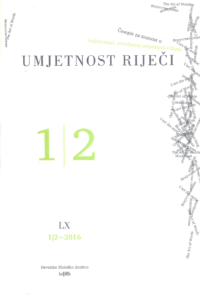Narativi sećanja: holokaust na ekranima bivše Jugoslavije
MEMORY NARRATIVES: HOLOCAUST ON TV SCREENS IN THE FORMER YUGOSLAVIA
Author(s): Nevena Daković, Aleksandra MilovanovićSubject(s): Cultural Anthropology / Ethnology, Sociology of Culture, History of the Holocaust, Film / Cinema / Cinematography, History of Antisemitism
Published by: Hrvatsko filološko društvo
Keywords: Holocaust; TV series; memory narratives; transnational memory; politics of memory;
Summary/Abstract: No other event in the history of the world has been so extensively researched and narrativised across a series of different inter/national media as the Shoah. One of the key moments in the revival of the theme is the American miniseries Holocaust: The Story of the Family Weiss (Marvin Chomsky, NBC), which premiered in 1978. Since, in the Western Balkans, the miniseries officially aired as late as 2009, the revival of the Holocaust narratives in the former Yugoslavia was marked by different American TV series: The Winds of War (Dan Curtis, ABC, 1983) and War and Remembrance (Dan Curtis, ABC, 1988). Broadcasted in vastly different contexts – the first one in the period of social freedom after the death of Josip Broz Tito (1986) and the second one on the eve of the wars that lead up to the break-up of the former Yugoslavia (1990/1991) – each played a distinctive role in the re-articulation of the traumatic past as well as in the making of the interpretative frame of reference for contemporary historical events. The paper considers three different ways in which the two series influenced the region, i.e. how they: a) enhanced the visibility of the Holocaust, previously pushed to the margins of history and memory of WW2; b) reshaped the local politics of memory from understanding the Holocaust as a transnational and “new cosmopolitan memory” to its manipulative appropriation as “remembering for the sake of benefit”. The latter implies identification of the nation with innocent victims which changes the attitude toward the past and the politics of remembrance. At the same time, it liberates the nation from the imperative of coming to terms with the nation’s troubled past; c) influenced the transformation of the local (hi)stories of the Shoah into Hollywoodised narratives of survival, which marked the new millennium. The paper finally examines the reception of the series which paved the way for change, by the press when the series first aired on TV, and in digital media (websites, blogs, etc.) when they were rebroadcast.
Journal: Umjetnost riječi
- Issue Year: 2016
- Issue No: 1-2
- Page Range: 1-26
- Page Count: 26
- Language: Croatian

